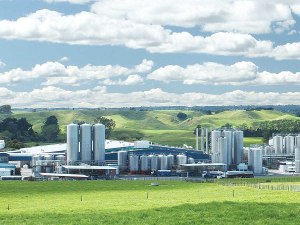Fonterra Suppliers Confident in Mainland Dairy Future
Fonterra's 460 milk suppliers in Australia, who will switch to Lactalis end of this month, are unfazed with the impending change.
 Fonterra says it owns 29 farms around its factories to irrigate with excess water from manufacturing plants.
Fonterra says it owns 29 farms around its factories to irrigate with excess water from manufacturing plants.
Fonterra says it is looking at the most responsible ways to take care of any excess water from manufacturing processes.
The co-operative says it cares about the environment and the communities in which it operates.
In a statement posted on its website, the co-op says it is always looking for ways to improve, and one area that’s always a focus for them is water. The co-op came under fire last week after media reports that a Cambridge couple Neville and Denise Ross discovered higher than acceptable levels of nitrates in their bore drinking water. The couple live near Fonterra’s Buxton Farm, which had been used to irrigate wastewater from the company’s Hautapu factory a few kilometres away.
Fonterra says it owns 29 farms for the primary purpose of nutrient management. Water coming from manufacturing plants is irrigated on these farms.
The co-op says each manufacturing site has different requirements in relation to water treatment and meeting its own regional limits and environmental standards.
“When managed well, we can use the treated water from our factories to help grow grass and other crops such as hemp.
“We can then harvest these crops for worthwhile uses such as making animal feed. This provides us with a nice circular model for nutrient management.
“This is the model we have in place in Hautapu where we’ve been operating a ‘cut and carry’ farm for a couple of years.”
The co-op rejects the term ‘ghost farm’ used by some media.
“You may have heard these referred to as ‘ghost farms’, as there aren’t any cows on them – but that’s not a real term,” it says.
“It’s actually that we’ve created an alternative use for this land, which enables us to grow crops, using water from our sites to provide the nutrients required for them to grow well.”
It says the treatment processes are designed to ensure the impacts on the environment are acceptable and remain within the limits set by regional councils.
But Fonterra says it is looking at improving its operations to fit with the changing landscape.
“As the land-use around our factories has changed over time and is starting to become more residential, it’s important we change our approach to nitrogen management too.
“We’re looking for ways to improve our operations to fit with the changing landscape. This is why we want to invest over the next 5 to 10 years to upgrade our waste water treatment facilities at our Hautapu, Edgecumbe, Whareroa, Maungaturoto, Te Awamutu, Longburn, Reporoa, Kapuni and Clandeboye sites.
“In the meantime, in Hautapu we’re constantly monitoring levels. When we do become aware of cases that come close to the limits, we help by offering to install filters on residents’ water supplies.
“Safe drinking water is a serious issue and it’s important to understand the science on this topic. We work closely with the regulators and science providers to ensure our wastewater operations meet the needs of the environment and the community around them.”
Donald Trump's latest tariff tantrum has again thrown the world of trade into a new round of turmoil and uncertainty, and NZ is caught up in it.
The third edition of the NZ Dairy Expo, held in mid-February in Matamata, has shown that the KISS principle (keep it simple stupid) was getting a positive response from exhibitors and visitors alike.
Twenty years ago, South African dairy farm manager Louis Vandenberg was sent to a farm in Waikato to provide training on Afimilk technology.
Strong farmgate milk price is helping boost investment on farms, says PGG Wrightson chief executive Stephen Guerin.
Fonterra's 460 milk suppliers in Australia, who will switch to Lactalis end of this month, are unfazed with the impending change.
The 5+ A Day Charitable Trust has launched a collection of affordable recipes designed to turn everyday vegetables into seasonal stars.
OPINION: Is it a case of over promising and under delivering? Farmers think so.
OPINION: The UK dairy industry is celebrating a win after plant-based drink maker Oatly lost a long-running legal battle over…